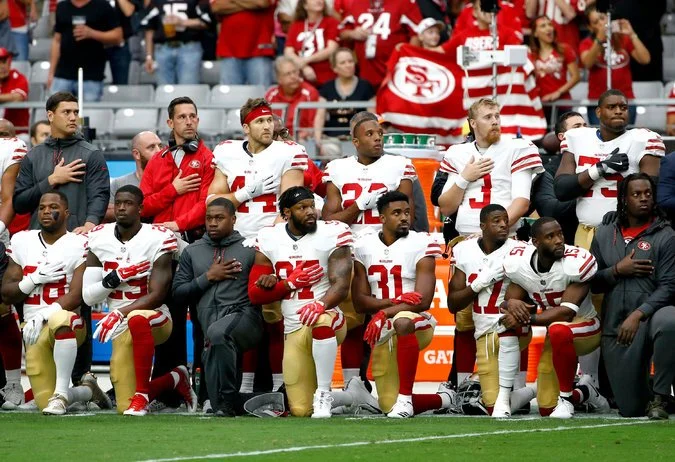Constitutional Law and National Anthem Protests by Daniel Tagliarina
The NFL has seen a wave of protests from players during the National Anthem. These protests largely began with Colin Kaepernick first sitting, and then kneeling during the anthem last season to protest police violence, especially when targeted against racial minorities. However, they have greatly expanded this season in the wake of President Trump’s attacks on those who had joined Kaepernick’s efforts to call attention to racial inequality in policing.
This effort to tamp down peaceful civic expression of displeasure with the current state of affairs in the U.S. has spread beyond the NFL. Stephen Curry of the Golden State Warriors has been vocal about his opposition to visiting the White House and this president after winning the NBA championship. Dale Earnhardt, Jr. recently quoted President Kennedy in a statement of support for other athletes who are protesting. However, Trump’s anti-athlete protest sentiments are gaining traction elsewhere. In addition to a rash of NFL fans burning season tickets and merchandise in protest, several high schools and colleges across the country have gotten publicity over their efforts to ban similar protests from their student athletes.
Colorado Christian University received a lot of press over their reaffirmation of their existing policy that requires all student athletes to stand for the pledge. A letter from the Principal of Parkway High School has been gaining attention as the Principal informed all student athletes that they are required to stand for the National Anthem and that “Failure to comply will result in loss of playing time and/or participation as directed by the head coach and principal.”
The athletic supervisor for Manatee County Schools in Manatee, FL issued a similar directive to the covered middle schools and high schools. Jason Montgomery, who is also running for a seat in the Florida state legislature, included in his letter that both federal law and Florida law require students to stand for the Pledge of Allegiance and National Anthem unless they have written permission from a parent or guardian to do otherwise.
While the federal law cited provides guidelines for actions during the national anthem, it does not actually legally require under threat of punishment specific actions. These instances are likely not the only examples of schools seeking to enforce standing for the National Anthem under threat of punishment for noncompliant athletes.
While many schools might want to enforce unity or patriotism, there are difficulties with doing so. According to the Supreme Court, the Constitution prohibits compelling students to engage in forced demonstrations of patriotism. In 1943, the Court ruled in West Virginia State Board of Education v. Barnette that schools could not compel students to salute the flag. Such forced demonstrations were seen as violations of the First Amendment’s protections of free speech. This ruling came during World War II at a time where national unity and patriotism were seen as crucial to supporting the war effort.
In his opinion for the Court in Barnette, Justice Jackson wrote, “[i]f there is any fixed star in our constitutional constellation, it is that no official, high or petty, can prescribe what shall be orthodox in politics, nationalism, religion, or other matters of opinion or force citizens to confess by word or act their faith therein.” In writing this, Jackson affirmed the protections for students from compulsory demonstrations.
“Can states compel students to salute the American flag? The Barnette case was decided in the midst of World War II, when the court might have been expected to be reluctant to strike down any effort to promote patriotism. But Jackson had his eye on what the nation was fighting for, and responded, ‘Those who begin coercive elimination of dissent soon find themselves exterminating dissenters. Compulsory unification of opinion achieves only the unanimity of the graveyard.’ ”
This includes students at sporting events, which the Supreme Court indirectly reaffirmed in Santa Fe Independent School District v. Doe in 2000. This core ideal of Barnette was reaffirmed in 1969 in the case Tinker v. Des Moines Independent School District. In Tinker the Court held that students retain their free speech rights in a school setting, especially when the context of that speech is political.
These cases strongly suggest that, as far as public schools and universities are concerned, students must be allowed to protest the National Anthem without fear of reprisal. Given the nature of private education in the US, these same restrictions do not apply. Typically, private schools are allowed to punish students for political speech that violates school rules.
With respect to the public schools; however, the line is clearer. While Colorado Christian University and similar institutions are fine, Parkway High School is not. The athletic supervisor for Manatee County’s statements indicate that there is the possibility for students to protest with written permission.
Whether the Constitution requires written permission is a gray area, but one that likely finds the school on the correct side of the law. Regardless of their reasons for doing so, public school and university officials must be careful to not violate their players’ First Amendment rights, or risk subjecting themselves up to legal liability and potential lawsuits.
Daniel Tagliarina is Assistant Professor of Government and Politics at Utica College.








